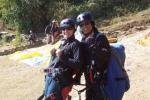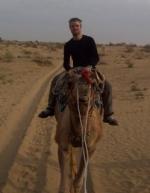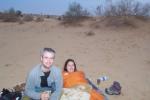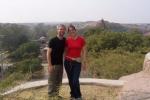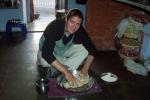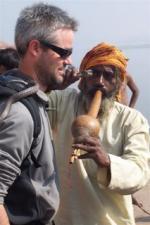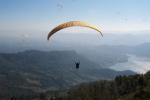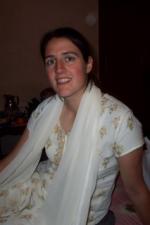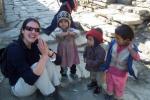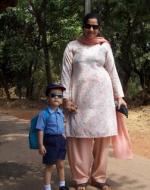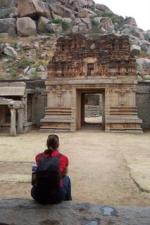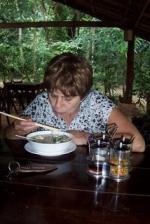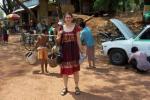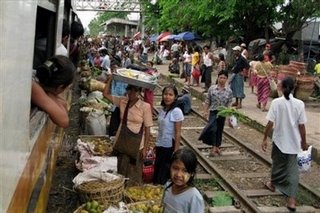
The Train Ride
A small mound of Burmese shrimp chips, smelly fish snacks, and beer cans wobbled precariously down the centre of the isle in cadence with the dangerous back and forth lurching of our Burmese train carriage. The packaged food mound rolled over a dense crowd of old crones sitting limply on the floor, all their bodies moving together side-to-side against the adjacent seat cushions in a kind of sea-sick narrow-gauge train rave. The mound stopped beside Katlijn's bobbing sleeping head. Astonishingly, a smiling face popped out from behind the plastic baggies of red chilli sauce and through the thick stench of dried prawn flakes.
Just as two scrawny arms emerged from the pile of dubious Burmese treats, the entire mound exploded.
Every crone in the train rave swivelled their heads in a single group motion at the former lump of smoked sea goodies, its shell of dodgy snack bags blown clear away revealing only its skeleton: a spindly Burmese kid with two thin outstretched arms holding the twisted remains of a couple of old plastic bottles- their entire contents had exploded forth on top of Katlijn.
Katlijn blinked and grimaced in her sleep, slowly awakening from her slumber, trying to discern nightmare from reality. A familiar flash of insight settled over her, a relapse, a recurrence: the whole stinking wobbling humiliation of it all. She was drenched in an oily fermented bath of whatever rank-smelling liquid Burmese people drink with their salty fish nuts.
An oddly familiar old monk with giant spectacles and splotches of grey hair sprouts turned around and clarified the situation: "Palm wine," he began- a poor man's spirit even by Myanmar standards. "All this train rocking must have caused it to burst from the plastic containers," he wisely explained.
Surrounding her was a sea of huddled old crones, and one terrified boy covered in soggy fish bits, smiling nervously at her, all waiting expectantly for her reaction. Everybody seemed to grasp what had happened but Katlijn; being on the receiving end of a massive palm wine explosion, it appeared, was perfectly normal- a kind of Burmese public transportation rite-of-passage.
Katlijn, to her credit, resisted the temptation to heap racist expletives at the poor terrified Burmese kid and, in a remarkable feat of equanimity that even raised the eyebrows of our kindly old monk friend, smiled with all the grace and humility she could muster, untied her hefty backpack from the shelf, found a reasonably clean set of North Fakes, slowly rocked and swayed her way through the grinning, toothless, undulating crones, and locked herself into the ridiculously dark and tiny confine of the Burmese public train toilet facilities.
The monk smiled warmly after her in approval and there was an audible murmur of relief among the squatting crones. The skeletal boy, saved from a gargantuan loss-of-face, seemed to relax a bit and even tried half-heartedly to sell me a few dried crab-sticks.
Katlijn later told me that as she crouched naked in the toilet room, swinging wildly against the slimy walls, washing off the stench of palm wine from her hair using the train's only semi-functioning bum-gun, she realized that this very moment was the ultimate low point in her world trip.
Off the Beaten Path
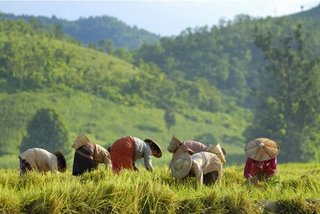
We arrived in the late afternoon at Hsipaw, a gorgeous town surrounded by rice-paddies. A pleasant place where the backpacker-friendly locals introduced themselves as "Mister- something" to help tourists remember them. There was Mister Charles, the hotelier. There was the paranoid Mister Books, who sold books. There was even a grubby street vendor calling himself Mister Bean, "I sell the best beans in Hsipaw !"
There were also more tourists in Hsipaw than anywhere else in the north
Shan State. Hsipaw, it turned out, was a burgeoning Burmese backpacker town. I don't have anything against backpackers, but the same conversations we have together were starting to get old: where we are from, where we are going to, and how truly sick to death we all are of instant Chinese noodles. We wanted new conversation, new experiences, new people, an undiscovered country. We wanted to be in the same illusive place all the other backpackers wanted to be, but paradoxically couldn't find: out in the sticks, the boondocks, Woop Woop, off the beaten path.
Just as a giant cyclone smashed through Yangon, days before Myanmar would briefly enter the ephemeral space of international consciousness, Katlijn and I, in our own private quest to realize the great backpacker dream, hired two biker kids to drive us out of Hsipaw.
To drive us not just off the beaten path, but as far away from it as we could get. We wanted to be as far away from the beaten path (while still outside rifle range of the nearest insurgency and armed opium plantation) that we could possibly be. And this, we learned, was a place in Myanmar called Namsan.
The Motorbike Ride
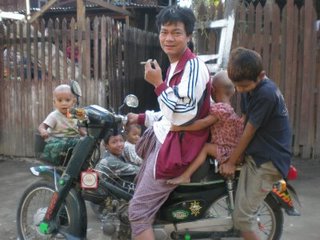
The road-not-taken turns out to be full of massive ruts and, on the back of a flimsy made-in-china motorbike, a thoroughly harrowing ass-numbing experience. It is a road so old and forgotten it hadn't been maintained since the age of empires, often causing us to cling to our underage drivers for fear of our lives as we skidded along the muddy potholes in the pouring rain. We stopped once to watch a local bus unloaded all its passengers before crossing a water-logged wooden bridge that sagged and groaned in imminent collapse. When it was our turn to cross the rotting colonial-era infrastructure, my driver clenched the accelerator inducing a sad painful wine from our flimsy hog, while yelling over his shoulder "too risky to cross with passengers !"
Ignoring his own advice, we slowly sputtered our way to the other side.
The Challenge
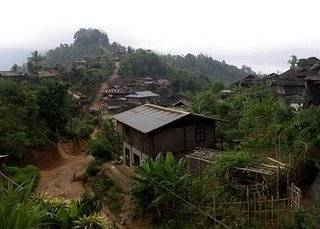
Though the old road from Hsipaw to Namsan is only 80 km long, it took us five hours and a two motorbike breakdowns to make it all the way up. We donated $1 to the nefarious regime for the privilege of spending a night at the only guesthouse in town.
Namsan itself is a charming village of wooden houses set atop a world of stunning forested hills accompanied by the soundtrack of distant cow bells. If not for its population of Palaung tea pickers and Chinese shop-keepers, Namsan might look like a centuries-old New World pioneer settlement, though the locals prefer to call it "The Switzerland of Myanmar". Out in the distance we gazed over a real no-man's land, apparently one of the least visited places on the planet. Somewhere out there, beyond those hills, grew nearly half the world's opium and the Burmese government waged a brutal, unknown, and ancient conflict against renegade Shan hill tribes still struggling for their independence.
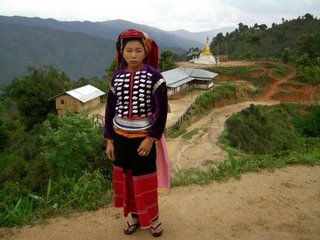
Palaung woman in traditional hand-woven tribal clothes.
It wasn't long before we were introduced to the town's only English speaking locals. A jovial old woman calling herself "Macy" spoke impeccable English and was eager to invite us for a little conversation practice with her young students over the obligatory pot of Burmese green tea. "Sandy" guided us around the hills and introduced us to the local factory workers at the tea plantations. Despite the incredible hospitality of the towns-people, a suppressed fear kept gnawing at us from the back of our minds: we would soon have to endure the muddy five hour spank of the road-not-taken back to civilization.
Over the mechanical clatter of nineteenth century imperial tea machines, we brought this fear up with the town mayor and a gang of curious factory workers. They could instantly relate: even they avoided crossing that old bridge if at all possible and wanted nothing more than to help us find a way around it. The mayor proudly handed us a dusty old English-language encyclopaedia volume (letters C-D) written more than seventy years ago- a bit of light reading material while they hammered out a plan. A huge raucous debate soon ensued all around us as everyone collaborated furiously trying to figure out what do with us. Katlijn and I thumbed sheepishly through the fusty encyclopaedia, until finally they reached some sort of consensus. Taking great pride in his achievement, the mayor presented us a crumpled old Chinese Valentine. He opened up the heart-shaped card revealing a sophisticated drawing of boxes and lines labelled with that mysterious sequence of shapes and squiggles we had come to recognize as Burmese text.
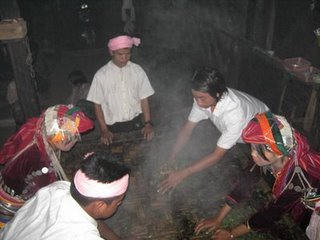
Palaung factory workers drying and sorting tea leaves over a thatched bamboo table.
After a lot of hand waving, shouting, and charades, we gathered that they had, in fact, drawn us a map of the region describing a network of tiny backwater villages, monasteries, and shrines that would lead us back to civilization. Every time we walked into a new box on the map, we were to turn the card over and show the nearest crone the squiggles written on the back. Sandy explained that those squiggles roughly translated as "take me to your leader."
Everyone insisted that if a stranger walks into a Palaung tribal village, the locals would not only be delighted, they would feed us, give us a bed to sleep on, and point us to the next box on our map. It was more than just hospitality: it was a cultural and religious obligation. The Buddhist monks and villagers had to help us, there was no need to bring food or water for the journey. Thus, we were faced with the following challenge:
Could a couple of dumb white backpackers with no knowledge of the local language or culture survive the three day journey back to civilization, bypassing entirely the road-not-taken, with nothing more than plain old Burmese hospitality and a map scribbled on the back of a tatty piece of Asian Kitsch ?
Armed with only this, a lot of water purification tablets, and some emergency instant Chinese noodle packs, Katlijn and I set forth to find out.
The Hospitality
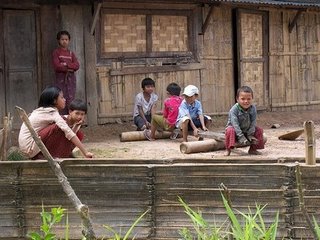
We began the journey with some trepidation. A close inspection of the map revealed that few factory workers could agree upon which boxes should be connected together. In fact, the entire card was riddled with scratched out lines and alarming little question marks. To make matters worse, nobody seemed to know what kind of distances were involved. One line between two boxes could take anywhere from one hour to a full day depending on which puzzled monk we showed our card to. Clearly, we were going to be relying a lot on Burmese hospitality.
We put this hospitality to test when we arrived wearily at the first box on our map: a village consisting of a handful of thatched bamboo huts and the unlikely demographic of about fifty toddlers and four old crones. The kids went absolutely ballistic when we stumbled into town, crying out Burmese greetings while tugging relentlessly on my leg hairs. They sat us down in one of the houses, poured us a cup of bitterly green Burmese tea, and prepared us a feast.
We would have been content just to receive some hot water for our instant noodles, but they spent a good hour cooking us an assortment of local Palaung fare which they arrayed for us on a tree stump: rice, vegetables, spicy fish sauce, chunks of raw sugar, and a salad made from tea leaves. As we sat with a family shovelling this into our mouths with our fingers, the entire village came out to watch us eat. Some food tasted great and went down easily, other dishes required considerable determination to get through without wincing in front of our gathering hosts. Tea leaf salad was particularly challenging. Having the consistency of spinach but tasting something like a used Lipton tea bag, I imagine it would take a lifetime of cultural up-bringing to fully acquire a taste for it.
In retrospect, despite the fact that we didn't know what we were eating most of the time, we couldn't understand a word anybody was saying to us, and palm wine featured prominently on the menu, the home-cooked meals we shared with the Palaung tribes were some of the finest dining experiences we ever had.
|



